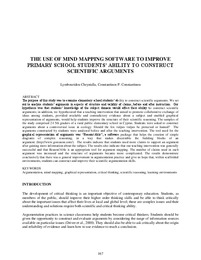| dc.contributor.author | Lymbouridou, Chrystalla | en |
| dc.contributor.author | Constantinou, Constantinos P. | en |
| dc.coverage.spatial | CY - Λευκωσία | en |
| dc.creator | Lymbouridou, Chrystalla | en |
| dc.creator | Constantinou, Constantinos P. | en |
| dc.date.accessioned | 2021-05-19T11:35:01Z | |
| dc.date.available | 2021-05-19T11:35:01Z | |
| dc.date.issued | 2003 | |
| dc.identifier.uri | http://gnosis.library.ucy.ac.cy/handle/7/64601 | |
| dc.description | Περιέχει το πλήρες κείμενο | el |
| dc.description.abstract | The purpose of this study was to examine elementary school students’ ability to construct scientific arguments. We set out to analyze students’ arguments in aspects of structure and validity of claims, before and after instruction. Our hypothesis was that students’ knowledge of the subject domain would affect their ability to construct scientific arguments; in addition, we hypothesized that a teaching intervention that aimed to promote collaborative exchange of ideas among students, provided available and contradictory evidence about a subject and enabled graphical representation of arguments, would help students improve the structure of their scientific reasoning. The samples of the study comprised 24 5th graders of a rural public elementary school in Cyprus. Students were asked to construct arguments about a controversial issue in ecology. Should the fox vulpes vulpes be protected or hunted? The arguments constructed by students were analyzed before and after the teaching intervention. The tool used for the graphical representation of arguments was “Reason!Able”, a software package that helps the creation of simple diagrams of complex reasoning, in a way that makes discernible the building blocks of an argument. (http://www.goreason.com/). The results indicate that students used more claims to support an argument after gaining more information about the subject. The results also indicate that our teaching intervention was generally successful and that Reason!Able is an appropriate tool for argument mapping. The number of claims used in each argument was increased and the structure of arguments became more complicated. The results demonstrate conclusively that there was a general improvement in argumentation practice and give us hope that, within scaffolded environments, students can construct and improve their scientific argumentation skills. | en |
| dc.language.iso | eng | en |
| dc.publisher | Department of Educational Sciences, University of Cyprus | en |
| dc.relation.ispartof | Teaching and learning | en |
| dc.rights | info:eu-repo/semantics/openAccess | en |
| dc.rights | Open Access | en |
| dc.source | CBLIS Conference Proceedings 2003 Volume II: The educational potencial of new technologies | en |
| dc.title | The use of mind mapping software to improve primary school students’ ability to construct scientific arguments | en |
| dc.type | info:eu-repo/semantics/conferenceObject | |
| dc.subject.uncontrolledterm | Argumentation | en |
| dc.subject.uncontrolledterm | Mind mapping | en |
| dc.subject.uncontrolledterm | Graphical representation | en |
| dc.subject.uncontrolledterm | Critical thinking | en |
| dc.subject.uncontrolledterm | Scientific reasoning | en |
| dc.subject.uncontrolledterm | Learning environments | en |
| dc.contributor.conferenceorganizer | Learning in Physics Group, University of Cyprus | en |
| dc.contributor.coordinator | Constantinou, Constantinos P. | en |
| dc.author.faculty | Σχολή Κοινωνικών Επιστημών και Επιστημών Αγωγής / Faculty of Social Sciences and Education | |
| dc.author.department | Τμήμα Επιστημών της Αγωγής / Department of Education | |
| dc.type.uhtype | Conference Object | en |
| dc.contributor.orcid | Constantinou, Constantinos P. [0000-0003-3183-4131] | |
| dc.gnosis.orcid | 0000-0003-3183-4131 | |

